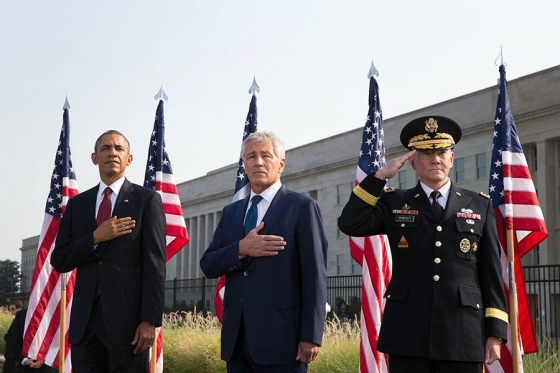The headline should have read yesterday:![]()
“US President elected to end military quagmires in the Middle East fires prominent anti-quagmire Defense Secretary, ramps up for ambiguous Middle Eastern quagmire.”
Whatever the reasons for US president Barack Obama’s decision to fire defense secretary Chuck Hagel, it’s clear that Hagel’s brand of foreign-policy realism is falling ever further out of favor, as the Obama administration moves toward a more interventionist approach to foreign policy in its final two years.
Though the decision, in superficial ways, is similar to the 2006 resignation of former defense secretary Donald Rumsfeld, which also followed a devastating midterm election for president George W. Bush, Hagel’s experience at the Pentagon had little in common with Rumsfeld’s tenure.
Hagel, his worldview forged as a squad leader in the US army infantry during the Vietnam War, was always a cautious prairie conservative. As a former US senator from Nebraska, Hagel stood up to his own Republican Party over the conduct of the US occupation of Iraq in the mid-2000s.
That skepticism seemed to be pitch-perfect for the Obama administration in earlier years, when it was taking pains to extricate the United States from internal conflicts in the Middle East.
Obama successful ended the US occupation of Iraq, he studiously avoided taking sides in the Syrian civil war (even when it meant swallowing criticism for backing away from his ‘red line’ statement about the use of chemical weapons), and he kept US military assistance to a minimum in the NATO-led effort to support anti-regime rebels in Libya.
Critics have argued that the Obama administration has pursued a disengaged approach to world affairs, thereby explaining both Libya’s disintegration into chaos and, in no small measure, the vacuum that allowed the Islamic State group (الدولة الإسلامية) to wreak havoc throughout traditional Mesopotamia — eastern Syria and western Iraq.
That criticism seems to have resonated with Obama and his foreign policy and national security team, and Obama’s apparent decision to make a personnel change seems more important than the fact that Hagel is out and someone new is in. Telescoping that decision comes with the real costs involved with pushing a high-profile nomination through what will be a Republican-controlled Senate in January 2015. Hagel stumbled from the beginning, starting with the Congressional hearings upon his appointment and who seemed to lack the presence for the role. But neither he nor his successor is likely to call the shots on foreign policy.
It’s notable that, according to most new sources, the top two candidates to replace Hagel — Michèle Flournoy, former under secretary of defense for policy, and Ashton Carter, former deputy secretary of defense — were frequently
Regardless of Hagel’s successor, decisions about the aggressiveness with which the United States will pursue the Islamic State and other actors in the Middle East will still rest in the hands of the White House — with chief of staff Denis McDonough and national security adviser Susan Rice, despite their acrimonious relationship, and not with Hagel’s replacement or even with US secretary of state John Kerry. Showing the door to Hagel, a bipartisan symbol of policy restraint and realist skepticism, sends a clear message about the path Obama believes his administration will take in 2015 and beyond.
But there was always a strong case that the critics were wrong, and restraint was the better course. The volte-face over ‘red lines’ gave way to a largely successful push to rid Syria of its chemical weapons stockpiles. Certainly, the blame for Islamic State’s rise has much more to do with both the failures of former Iraqi prime minister Nouri al-Maliki and with the historical divide between Iraqi Shi’a and Sunnis than with US withdrawal in 2011. Furthermore, Obama’s decision not to back rebels with military-grade aid in Syria has kept the United States from choosing sides between Sunni jihadists and Shiite forces backed by Iran, Hezbollah and president Bashar al-Assad.
Nonetheless, as the United States increasingly engages Islamic State (the Obama administration doubled to 3,000 earlier this month the number of military ‘advisers’ deployed to Iraq), it will transform a fight between Shiite Iraqi leaders and Sunni rebels, or even between competing Sunni forces, into a more fundamental struggle of Muslims against the West. In so doing, the Obama administration risks elevating Islamic State to the level of a serious US adversary, a decision that US policymakers could come to regret in a decade’s time if (or when) an even more violent Sunni insurgency emerges, no matter who presides over the Pentagon in the last quarter of the Obama era.
